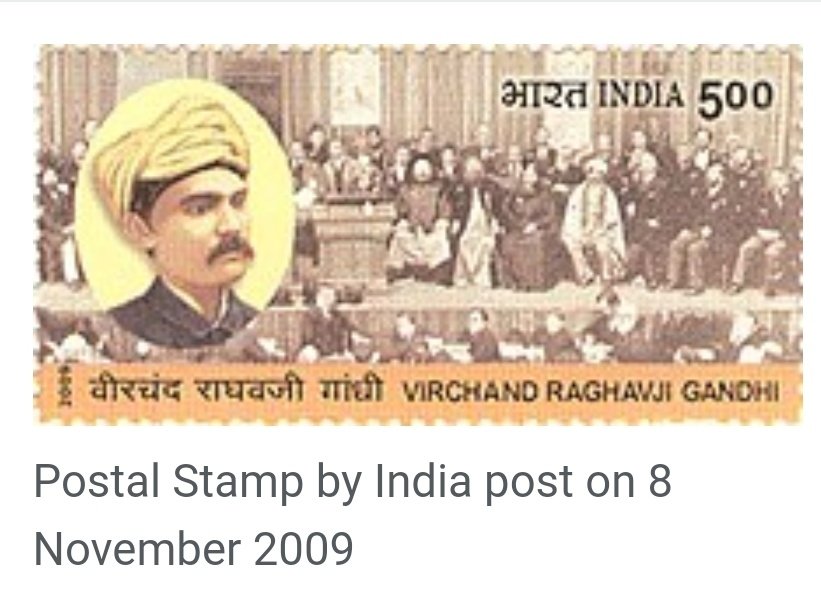Remembering him on Death Anniversary.
Virachand Raghavji Gandhi
(25 August 1864 – 7 August 1901) was @Shwetambar_ Jain scholar who represented Jainism at the first World Parliament of Religions in 1893.
A barrister by profession, he worked to defend the rights of Jains.(1/n)
Virachand Raghavji Gandhi
(25 August 1864 – 7 August 1901) was @Shwetambar_ Jain scholar who represented Jainism at the first World Parliament of Religions in 1893.
A barrister by profession, he worked to defend the rights of Jains.(1/n)
Gandhi was born in Mahuva near Bhavnagar (now in Gujarat, India), to Mahuva Nagar Sheth Raghavji Tejpalji Gandhi. His father, Raghavji, was a businessman. After completing primary and secondary school in Mahuva, Gandhi was sent to Bhavnagar for further studies (2/n)
In 1879, Gandhi married Jiviben. At the age of sixteen, upon placing first on the Bhavanagar matriculation examination, he was awarded the ‘Shri Jaswant Singhji’ scholarship. Gandhi continued his education at Elphinstone College, of the University of Bombay.(3/n)
He graduated with honors in 1884, having earned a bachelor's degree in law.[2][3][4][9] Gandhi was a polyglot who spoke fourteen languages, including Gujarati, Hindi, Bengali, English, Prakrit, Sanskrit, and French.[3] Gandhi was a friend of Mahatma Gandhi, (4/n)
Virchand helped Mahatma in his struggle to establish a legal practice.
In 1885, at the age of 21, he became the first honorary secretary of the Jain Association of India. During his term, he fought against a tax being levied on pilgrims visiting Mount Shatrunjaya, Palitana.(5/n)
In 1885, at the age of 21, he became the first honorary secretary of the Jain Association of India. During his term, he fought against a tax being levied on pilgrims visiting Mount Shatrunjaya, Palitana.(5/n)
Gandhi met Lord Reay, the British colonial governor of Bombay, and Colonel John Watson of the Kathiawar Agency. With the help of these two individuals, he ultimately negotiated an annual fixed payment of Rs. 15000, rather than an individual tax on each pilgrim (6/n)
Gandhi also fought to close a pig slaughterhouse that had been started in 1891 close to Mount Shikharji, a holy place of Jain pilgrimage. Gandhi spent six months in Calcutta learning Bengali and preparing his case against the slaughterhouse (7/n)
Gandhi represented Jainism at the first World Parliament of Religions, held in Chicago in 1893. Acharya Vijayanandsuri, also known as Acharya Atmaram, had initially been invited to represent Jainism, but as Jain monks do not travel overseas, he could not attend.(8/n)
Atmaram recommended Gandhi to go in his stead and serve as the emissary for the religion Atmaram and his disciple Vallabhsuri trained him for six months.He received a positive response and was asked to deliver more lectures.He stayed 2 years in the US and one year in the UK(9/n)
He went outside India to promote Jain values on two other occasions,[4] and is known for giving about 535 lectures on Jainism and having attracted followers from outside India to Jainism.[4] He was awarded various medals for his lectures. (10/n)
Herbert Warren, who studied Jainism under Gandhi and adopted the Jain religion, published a book on Gandhi's lectures titled Herbert Warren's Jainism.
The American newspaper, the Buffalo Courier, wrote regarding Gandhi, "of all Eastern scholars,(11/n)
The American newspaper, the Buffalo Courier, wrote regarding Gandhi, "of all Eastern scholars,(11/n)
it was this youth whose lectures on Jain Faith and Conduct was listened to with the greatest interest and attention". Later, in Kasadova, he delivered a lecture on 'Some Mistakes Corrected' on 8 August 1894, which prompted the citizens of the city to award him a gold medal.(12/n)
He propagated the relevance of Jain tenets and Mahavira's message of nonviolence. He delivered about 535 speeches on Jainism, and social and cultural lives in India, all of which received wide publication. He was invited two more times, first in 1897, and then in 1899 to the West
Gandhi founded Gandhi Philosophical Society and the Society for the Education of Women in India (SEWI). He participated in Pune session of Indian National Congress in 1895 as a representative of Bombay state,[2][4] and lectured on Indian politics and industry (14/n)
He also participated at the International Conference of Commerce in 1899 and represented Asia. He settled tax disputes of Palitana and Shikharji piggery case.
Gandhi died at the age of thirty-seven_of haemorrhaging of the lungs on 7 August 1901 at Mahuwar, near Mumbai (15/n)
Gandhi died at the age of thirty-seven_of haemorrhaging of the lungs on 7 August 1901 at Mahuwar, near Mumbai (15/n)
Gandhi was accorded both a welcome and honour by many literary and spiritual institutions, churches and societies. He was presented with medals.[2]
A museum was constructed and dedicated to Gandhi in 1964.[2]
(16/n)
A museum was constructed and dedicated to Gandhi in 1964.[2]
(16/n)
In the 1990s, statues of Gandhi were erected in Chicago and Mahuva.[2]
He was remembered on 1993 Parliament of World religions.[4]
A drama based on his life, Gandhi Before Gandhi, was performed 200 times throughout the world.
(17/n)
He was remembered on 1993 Parliament of World religions.[4]
A drama based on his life, Gandhi Before Gandhi, was performed 200 times throughout the world.
(17/n)
On 8 November 2009, the Indian Postal Department honoured him by issuing a postal stamp with his image
(18/n)
Source https://en.m.wikipedia.org/wiki/Virchand_Gandhi
(18/n)
Source https://en.m.wikipedia.org/wiki/Virchand_Gandhi

 Read on Twitter
Read on Twitter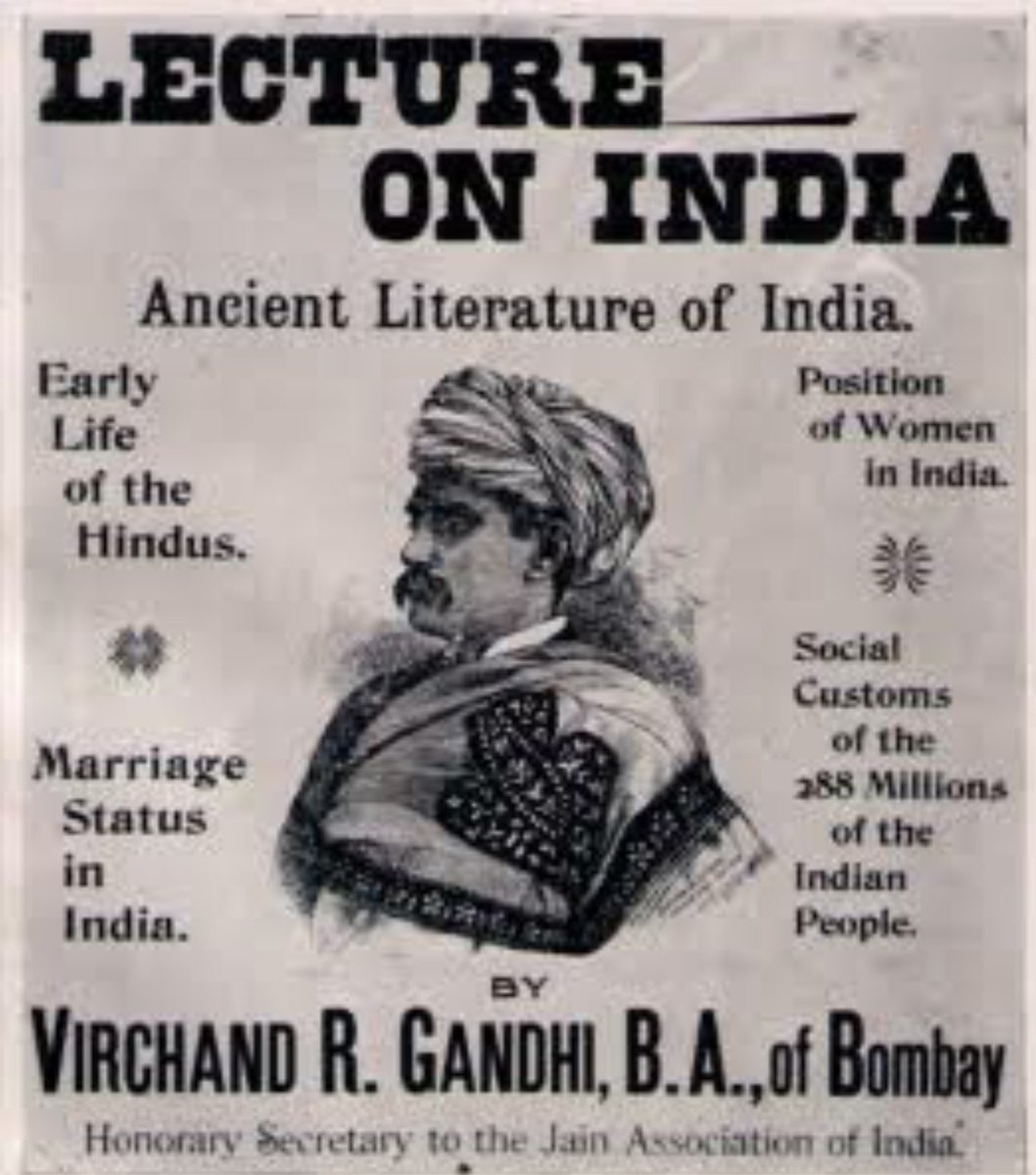
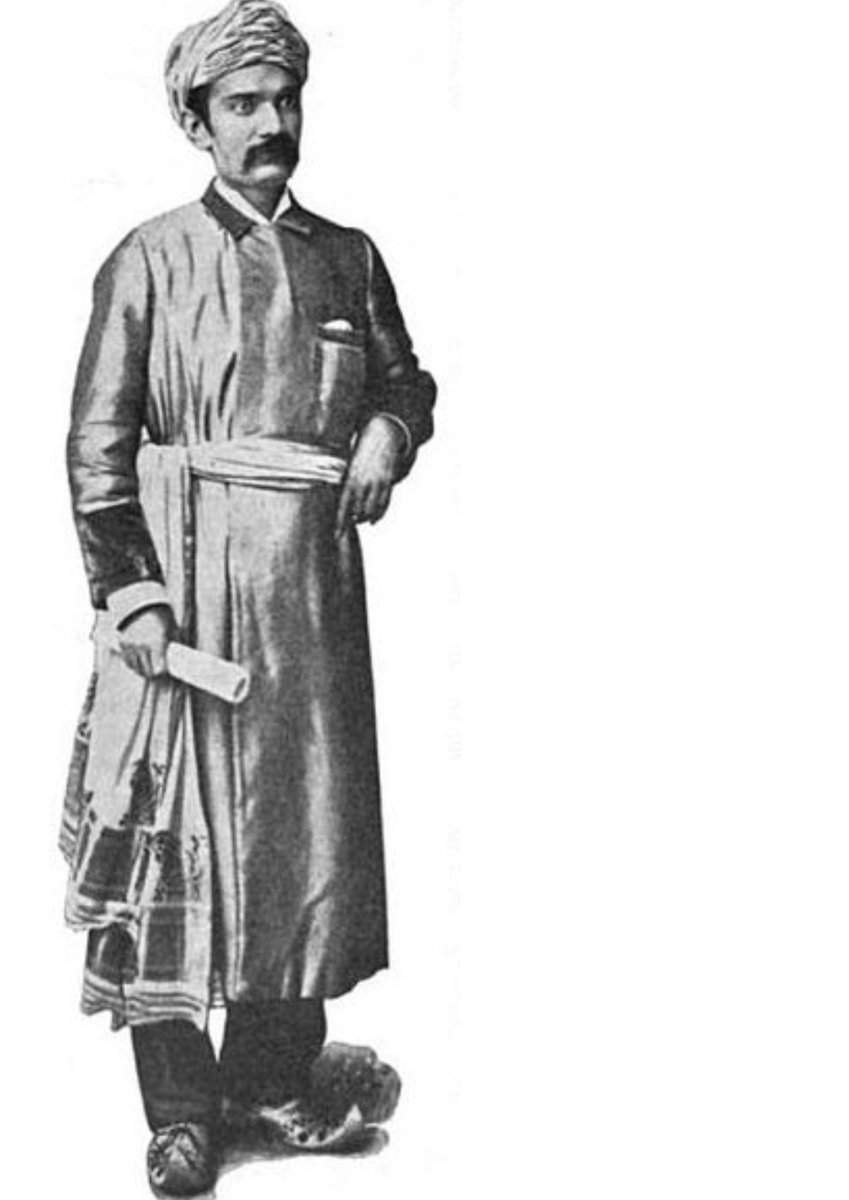
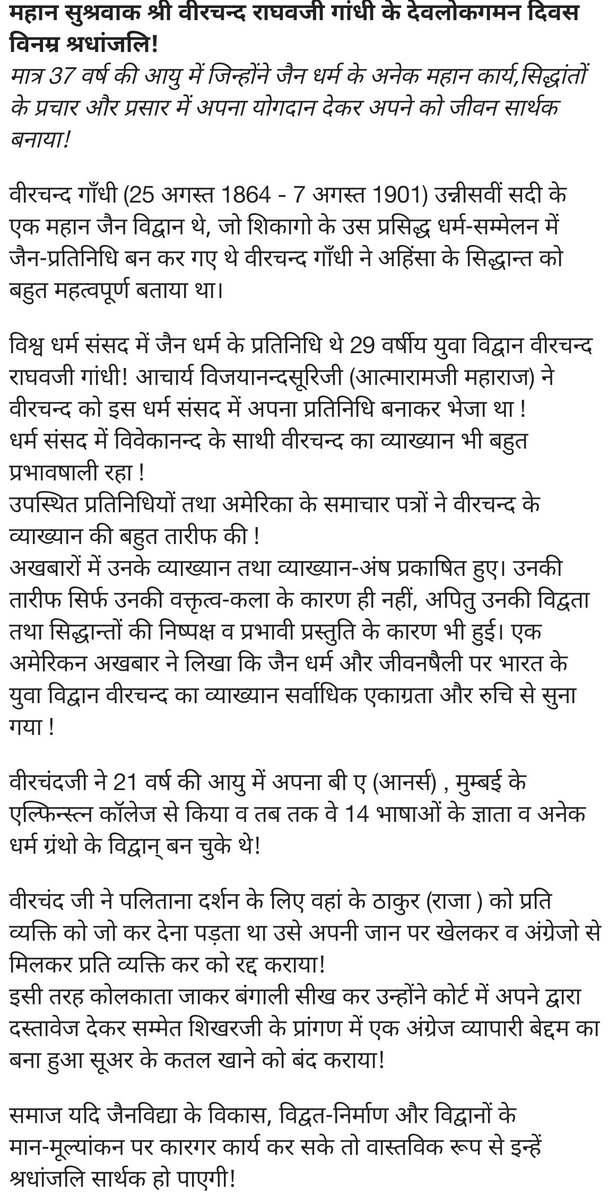
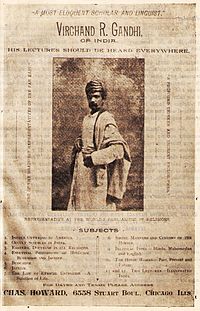
![Gandhi founded Gandhi Philosophical Society and the Society for the Education of Women in India (SEWI). He participated in Pune session of Indian National Congress in 1895 as a representative of Bombay state,[2][4] and lectured on Indian politics and industry (14/n) Gandhi founded Gandhi Philosophical Society and the Society for the Education of Women in India (SEWI). He participated in Pune session of Indian National Congress in 1895 as a representative of Bombay state,[2][4] and lectured on Indian politics and industry (14/n)](https://pbs.twimg.com/media/Ee0fJ7uU8AEFpdn.jpg)
![Gandhi founded Gandhi Philosophical Society and the Society for the Education of Women in India (SEWI). He participated in Pune session of Indian National Congress in 1895 as a representative of Bombay state,[2][4] and lectured on Indian politics and industry (14/n) Gandhi founded Gandhi Philosophical Society and the Society for the Education of Women in India (SEWI). He participated in Pune session of Indian National Congress in 1895 as a representative of Bombay state,[2][4] and lectured on Indian politics and industry (14/n)](https://pbs.twimg.com/media/Ee0fKIjU8AANKdO.jpg)
![Gandhi was accorded both a welcome and honour by many literary and spiritual institutions, churches and societies. He was presented with medals.[2]A museum was constructed and dedicated to Gandhi in 1964.[2](16/n) Gandhi was accorded both a welcome and honour by many literary and spiritual institutions, churches and societies. He was presented with medals.[2]A museum was constructed and dedicated to Gandhi in 1964.[2](16/n)](https://pbs.twimg.com/media/Ee0fnQuUMAALkJ8.jpg)
